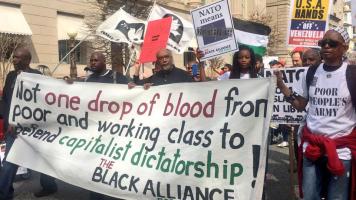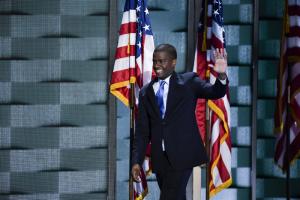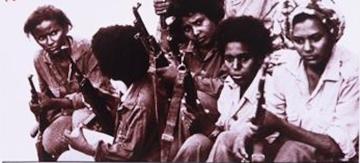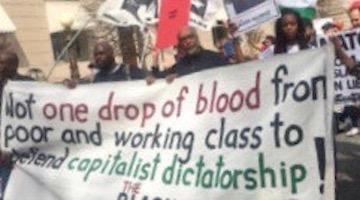Both see the United States as the Empire, and they agree that it must be opposed.
“Both believe science is the best means of opposing Empire and securing self-determination for the peoples of the world.”
In the summer of 1971, Julian Assange was born in Queensland, Australia amidst surging protests against the Vietnam War. Weeks later, George Jackson was murdered by correctional officers inside San Quentin, California’s oldest prison. Jackson spent his entire adult life behind bars, a political prisoner of the US Empire. Today, Assange faces a similar fate, a lifetime of imprisonment for daring to expose the Empire’s war crimes. Incarceration is the inevitable outcome for those who dare to challenge imperial power, for as Jackson wrote presciently in Blood in My Eye: “The ultimate expression of law is not order—it’s prison.”
Because Jackson was a revolutionary Marxist who advocated armed revolutionary violence to take over the state and Assange is a cypherpunk anarchist who advocates technology-supported non-violence to curtail state power, it may seem that the two activists have little in common. But by understanding Assange and WikiLeaks through the lens of George Jackson’s revolutionary philosophy, we can better appreciate how both Jackson and Assange dedicated themselves to challenging the US Empire in the name of self-determination for all peoples of the world.
Assange and Jackson met once in spirit. When Assange was twenty, he was arrested by the Australian Federal Police for working with his hacker group—The International Subversives—to gain access to the networks of Nortel, a Canadian telecommunications company. Though Nortel was not the first system Assange and the Subversives had entered—among their previous targets was the Pentagon—it would be the last, for the authorities traced one of his partners’ modems and tracked down the whole group one by one.
“I was alone and sad when [the police] came,” Assange explains in his Unauthorized Autobiography. “My wife and child had just left, and I had come to the end of my rope. My computer disks were strewn around the computer table. The squat was a mess, and I sat on the sofa reading—a vision of things to come—the prison letters of George Jackson, kept in the toughest US prisons at the pleasure of the authorities. I was broken.”
“Both Jackson and Assange dedicated themselves to challenging the US Empire in the name of self-determination for all peoples of the world.”
Fortunately for Assange, he would not have to experience what Jackson wrote of in Soledad Brother, for he was let off with a fine and probation because he didn’t steal or destroy anything in the Nortel system. But it is easy to think that, during his seven years trapped inside the Ecuadoran embassy in London, Assange would remember Jackson’s testimony from personal experience: “Few men would enjoy total isolation. To be alone constantly is torture to normal men.”
To be sure, Jackson and Assange are quite different ideologically speaking. As a Marxist-Leninist who took inspiration from Trotsky, Engels, Mao, and Fanon, Jackson always insisted that “As revolutionaries, it is our objective to move ourselves and the people into actions that will culminate in the seizure of state power. Our real purpose is to redeem not merely ourselves but the whole nation and the whole community of nations from colonial-community economic repression.” Jackson never wrote a page without reminding his readers that capitalism was the enemy’s system and that it must be destroyed along with the fascists who run it.
Jackson’s revolutionary philosophy is captured with one quote from Mao: “Every Communist must grasp the truth, ‘Political power grows out of the barrel of a gun.’”
“Jackson never wrote a page without reminding his readers that capitalism must be destroyed.”
By contrast, Assange is largely inspired by the cypherpunks, a movement of hackers who in the 1990s wrestled cryptography away from the US government and distributed it over the internet, making private digital communication possible for everyone in the world. “At the core of the cypherpunk philosophy,” one commentator explains, “was the belief that the great question of politics in the age of the internet was whether the state would strangle individual freedom and privacy through its capacity for electronic surveillance or whether autonomous individuals would eventually undermine and even destroy the state through their deployment of electronic weapons newly at hand.” “We were anarchists,” Assange says of the cypherpunks, “by temperament if not by political conviction.”
Unlike Jackson’s commitment to Mao’s dictum, Assange largely advocates the use of non-violent means of revolution by way of digital technology. “In the future,” he explains, “power would not come from the barrel of a gun but from communications, and people would know themselves not by the imprimatur of a small and powerful coterie, but by the way they could disappear into a social network with huge political potential.”
Notwithstanding these ideological differences, Jackson and Assange share three very important political positions.
The first political similarity between Jackson and Assange is that they both see the United States as the Empire, and they agree that it must be opposed. For Jackson, that “Yankee brigand” was “the greatest imperialism of all time.” While formal colonialism was fading from history, neocolonialism was emerging in the wake of decolonization. Not one to mistake a change the in Empire for the end of the Empire, Jackson observed that all US client states in Africa and Latin America were “sections of Amerikan imperial infrastructure.”
“We were anarchists by temperament if not by political conviction.”
Likewise, identifying the US as “the world’s sole remaining ‘empire,’” Assange argues that nation-states of the Global South must protect themselves from the National Security Agency using encryption. “Cryptography can protect not just the civil liberties and rights of individuals, but the sovereignty and independence of whole countries, solidarity between groups with common cause, and the project of global emancipation,” he writes. “It can be used to fight not just the tyranny of the state over the individual but the tyranny of the empire over smaller states.”
The second political similarity between Jackson and Assange is that they both advocate self-determination for peoples around the world. Jackson was principally concerned with the self-determination of the Black Colony within the US, but he was also convinced that if the people of the Black Colony did not fight the Empire from within, then those who—like the Vietnamese—were subjected to the external violence and oppression of the US government would never be free. Jackson looked to India and China as model nations who had gained independence from Western Empire, and he sought to replicate such independence for colonized populations at home and around the world.
“Jackson looked to India and China as model nations who had gained independence from Western Empire.”
In a similar fashion, in 2014, Assange criticized The Intercept—who acquiesced to US government demands not to tell an entire country of people that the NSA was recording the audio of every single phone call made in the country—for “protect[ing] US assets from arrest for the mass infringement of the rights of another nation’s people.” “By denying an entire population the knowledge of its own victimization, this act of censorship denies each individual in that country the opportunity to seek an effective remedy, whether in international courts, or elsewhere,” Assange added. “Such censorship strips a nation of its right to self-determination on a matter which affects its whole population.” The country was Afghanistan.
The third political similarity between Jackson and Assange is that they both believe science is the best means of opposing Empire and securing self-determination for the peoples of the world. Jackson’s preferred method was guided by “the subtle scientific principles of urban guerrilla warfare.” Against the top-heavy intelligence bureaucracies of the US government, the revolutionary vanguard would use mobility (portable weapons), infiltration (moles in the police, military, and agencies), ambush (surprise attack), and camouflage (“Nothing ever appears outwardly as it is”).
Likewise, Assange has argued that everything WikiLeaks does is based on science. Not only is WikiLeaks built using cryptography, the cypherpunk’s tool, it also practices a form of what Assange’s calls “scientific journalism.” “We work with other media outlets to bring people the news, but also to prove it is true,” he explains. “Scientific journalism allows you to read a news story, then to click online to see the original document it is based on. That way you can judge for yourself: Is the story true? Did the journalist report it accurately?” Just as scientists provide their data to be checked by other scientists, WikiLeaks provides its documents to be checked by the global public.
“We work with other media outlets to bring people the news, but also to prove it is true.”
Interestingly, there is a way in which the structure of WikiLeaks parallels Jackson’s principles of guerrilla warfare. Its mobility is enabled by the use of computers and hidden servers in various jurisdictions around the world. Its infiltration is embodied by the whistleblowers who leak classified documents. Its ambushes are its publications, given that the Empire never knows when they are coming or where they are coming from. And its camouflage is cryptography, preventing the empire from finding its sources or its servers.
WikiLeaks also achieves what Jackson called “the first step into revolutionary consciousness”: “a forceful attack upon prestige.” “Prestige must be destroyed,” Jackson insisted. “People must see the venerated institutions and the ‘omnipotent administrator’ actually under physical attack.”
As a self-styled “intelligence agency of the people,” WikiLeaks’ publications have certainly attacked the prestige of the US government and its two-party duopoly. The Iraq and Afghanistan War Logs embarrassed the Pentagon, who, despite being supported by the most advanced technologies and funded with the largest budgets in world history, is losing a twenty-year-long war to loosely organized tribal factions in the hinterlands of central Asia. Cablegate embarrassed the US diplomatic apparatus by exposing the petty, conniving, backstabbing actions and statements of its best and brightest. And the DNC and Podesta emails of 2016 exposed a corrupt Democratic Party leadership to those who, for some reason, believed with sincerity that the party actually has their best interests in mind. Like all emancipatory journalism, WikiLeaks pulls back the curtain that shields power from the public gaze, allowing the people to see exactly how the imperial pigs make their sausage.
“The DNC and Podesta emails of 2016 exposed a corrupt Democratic Party leadership.”
On September 23, 1941, George Jackson was born just as “the second great war for colonial markets was beginning in the U.S.” By the time he was 18 years old, he would be in prison on a one-year-to-life sentence for stealing $70 from a gas station. The District Attorney told him if he pleaded guilty, he would get a reduced sentence; instead, he spent the rest of his life behind bars. But Jackson knew that he was not imprisoned for theft, for his real crime was being a Black man living inside a racist Empire.
On April 11, 2019, Julian Assange was dragged out of the Ecuadorian embassy in London by United Kingdom police. The United States government has indicted Assange on seventeen counts under the Espionage Act and one count under the Computer Fraud and Abuse Act, for which he faces up to 175 years in a supermax prison. At 48-years-old, being convicted for even one-quarter of that would mean Assange would like likely die in prison. But we know that Assange is not being pursued for the theft of classified documents, for his real crime is doing the kind of journalism that exposes a racist Empire.
With the remaining three weeks of Assange’s extradition trial scheduled to begin September 7, we must remember Jackson’s insight: “The ultimate expression of law is not order—it’s prison.”
Patrick D. Anderson is a Visiting Assistant Professor of Philosophy at Grand Valley State University. His research focuses on the Anticolonial Tradition of Black Radical Thought and the connections between technology, ethics, and imperialism. He also contributes to Mint Press News. He can be reached at anderpat@gvsu.edu.
COMMENTS?
Please join the conversation on Black Agenda Report's Facebook page at http://facebook.com/blackagendareport
Or, you can comment by emailing us at comments@blackagendareport.com















